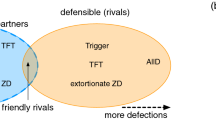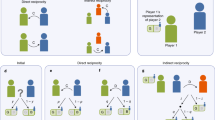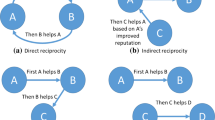Abstract
Cooperation is an important speciality of human behaviour. Unlike most creatures, people frequently cooperate with genetically unrelated strangers, often in large groups, with people they will never meet again. These patterns of cooperation can be explained by the theory of indirect reciprocity. That is to say, cooperation appears because it confers the image of a valuable community member. In a sense, to discriminate a valuable member is prerequisite for cooperation. By analytic model and computer simulations in this paper, we show the essence of cooperation mechanism consists of discriminators and punishment. In particular, we show that discriminators of different grades have dissimilar effects.
Preview
Unable to display preview. Download preview PDF.
Similar content being viewed by others
References
Alexander, R.: The biology of moral systems. Aldine de Gruyter, New York (1987)
Axelrod, R.: The Evolution of Cooperation. Basic Books, New York (1984)
Axelrod, R., Hamilton, W.D.: The evolution of cooperation. Science 211, 1390–1396 (1981)
Binmore, K.G.: Fun and Games: a Text on Game Theory. Heath and Co., Lexington Massachussetts (1992)
Boyd, R., Richerson, P.J.: The evolution of indirect reciprocity. Social Networks 11, 213–236 (1989)
Fehr, E., Gächter, S.: Altruistic punishment in human. Nature 415, 137–140 (2002)
Granovetter, M.: Economic Action and Social Structure: the Problem of Embeddedness. American Journal of Sociology 91, 481–510 (1985)
Hamilton, W.D.: The evolution of altruistic behaviour. American Nature 97, 354–356 (1963)
Hamilton, W.D.: The genetic evolution of social behavior. Journal of theory Biology 7, 1–16 (1964)
Hofbauer, J., Sigmund, K.: Evolutionary Games and Population Dynamics. Cambridge UP, New York (1998)
Leimar, O., Hammerstein, P.: Evolution of cooperation through indirect reciprocity. Proceedings of the Royal Society of London B 268, 745–753 (2001)
May, R.M.: Stability and Complexity in Model Ecosystems. Princeton University Press, Princeton (2001)
Nowak, M.A., Sigmund, K.: Evolution of indirect reciprocity by image scoring. Nature 393, 573–577 (1998)
Nowak, M.A., Sigmund, K.: The Dynamics of Indirect Reciprocity. Journal of Theoretical Biology 194, 561–574 (1998)
Roberts, G.: Competitive altruism: from reciprocity to the handicap principle. Proceedings of the Royal Society of London B 265, 427–431 (1998)
Bowles, S., Gintis, H.: The Origins of Human Cooperation. Santa Fe Institute Working Paper #02-08-035 (2002)
Smith, E.A., Bliege, B.: Turtle hunting and tombstone opening: public generosity as costly signaling. Evolution and Human Behavior 21, 245–261 (2000)
Sober, E., Wilson, D.S.: Unto Others: The Evolution and Psychology of Unselfish Behavior. Harvard University Press, Cambridge (1998)
Taylor, P.J., Jonker, L.: Evolutionary stable strategies and game dynamics. Mathematical Biosciences 40, 145–156 (1978)
Trivers, R.: The evolution of reciprocal altruism. Quarterly Review of Biology 46, 35–57 (1971)
Wright, J.: Altruism as signal: Zahavi’s alternative to kin selection and reciprocity. Journal of Avian Biology 30, 108–115 (1999)
Zahavi, A.: Reliability in Communication systems and the evolution of altruism. In: Stonehouse, B., Perrins, C.M. (eds.) Evolutionary Ecology. Macmillan Press, London (1977)
Zahavi, A.: Altruism as handicap: the limitations of kin selection and reciprocity. Journal of Avian Biology 26, 1–3 (1995)
Author information
Authors and Affiliations
Editor information
Editors and Affiliations
Rights and permissions
Copyright information
© 2005 Springer-Verlag Berlin Heidelberg
About this paper
Cite this paper
Du, P., Li, Y., Xu, W. (2005). Cooperation Evolution of Indirect Reciprocity by Discrimination. In: Deng, X., Ye, Y. (eds) Internet and Network Economics. WINE 2005. Lecture Notes in Computer Science, vol 3828. Springer, Berlin, Heidelberg. https://doi.org/10.1007/11600930_77
Download citation
DOI: https://doi.org/10.1007/11600930_77
Publisher Name: Springer, Berlin, Heidelberg
Print ISBN: 978-3-540-30900-0
Online ISBN: 978-3-540-32293-1
eBook Packages: Computer ScienceComputer Science (R0)




